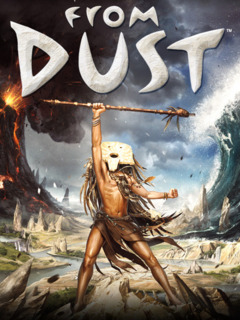Very fun, with some flaws.
Watching the elements interact is a lot of fun, and it's fairly in-depth too. Water erodes the sand, "sources" that spout from the ground move silt and create deltas, lava cools to solid rock, and a lot of other nifty little touches.
The gameplay is very simple - you use the left trigger to "inhale" an element, and the right trigger to "exhale" it - but because of how everything reacts, there are some moments of depth. You can also zoom in on villagers, but this doesn't really serve a purpose. The A button orders them to totems.
You lead the villagers to these totems where they perform a ritual and a village pops up, spreading vegetation and eventually some animals straight out of any given deep fantasy book. This is a fun process, but you have little control over it. You can add land around trees to help them grow or completely obliterate everything, but there's little in the way of nuance.
The maps all play differently, which is a very good thing. Your first major challenge is showing the villagers how to defend themselves from a tsunami, which is done by leading one to a special totem. He will then run to each village that's been founded and share the knowledge.
Seeing this in action is really awesome. It's like an overpowered version of the normal interactions. The water sweeps away the dirt and drags away trees, maybe catches a few stray villagers who were away from the village, but the village itself is safe from the drumming and chanting of the villagers. Your loyal subjects burst with personality.
On that note, it could be said that your subjects are like any given Disney child star: charismatic but dumb as a bag of rocks. They have serious pathfinding issues, primarily. Just a few moments ago I had to change my entire strategy for getting them to a totem and rebuild several parts of the island because they refused to take the easy way I'd laid before them. While they're afraid of puddles of water, they'll sometimes prance across an eroded land bridge merrily and then scream at me to save them when it breaks and they're carried out to sea.
This also unfortunately leads to the next problem which has been mentioned in every review, but deserves a place in this one anyway. The controls really suck sometimes. They're simple, but lack finesse. You can essentially move huge bits of land at once, and by holding the left and right trigger, you can even just dump everything at one spot. There's no option for slowly and meticulously fine-tuning a bit of land, which is a huge travesty when your little worshipers are screaming in terror from a puddle they refuse to pass. Sometimes I'm not even sure what's wrong with them and I just have to throw down some sand to try and quell their fears. In a game where there is essentially no learning curve and very few controls, this really shouldn't be a problem.
The story that goes along with how all of this madness came to be isn't anything memorable. It's not a bad story, but it's not the focal point of the game and serves only to move things along. You can unlock new bits of it by spreading life on your islands and such, but it's not worth it unless you're one of those people who needs to get the 100% completion rating.
The artistic style is very fresh and well-done. Everything looks very fluid and alive. I'm particularly fond of the soft blue water and how it looks when it's rushing. The game is beautiful, technically and artistically.
Let me also just take a moment to say a few things about it's comparisons to Black and White: it is nothing like Black and White. The similarities are that you're a god and you lead a tribe. The differences are that Black and White was part city-builder, part strategy, and this is almost more of a puzzle game. You can't order your villagers to kill each other, nor can you pick one up and sacrifice him for mana, nor can you attack enemy tribes. The creature in Peter Molyneux's game was also vastly more intelligent than all of your villagers combined. The two games are entirely separate kinds of fun, so that nonsense about them being similar can stop.
All in all, this is a game that pretty much anyone who can enjoy something without violence would like. It's got a pretty universal appeal. If you can put up with some annoyances along the way, it's really a gem of a game.

